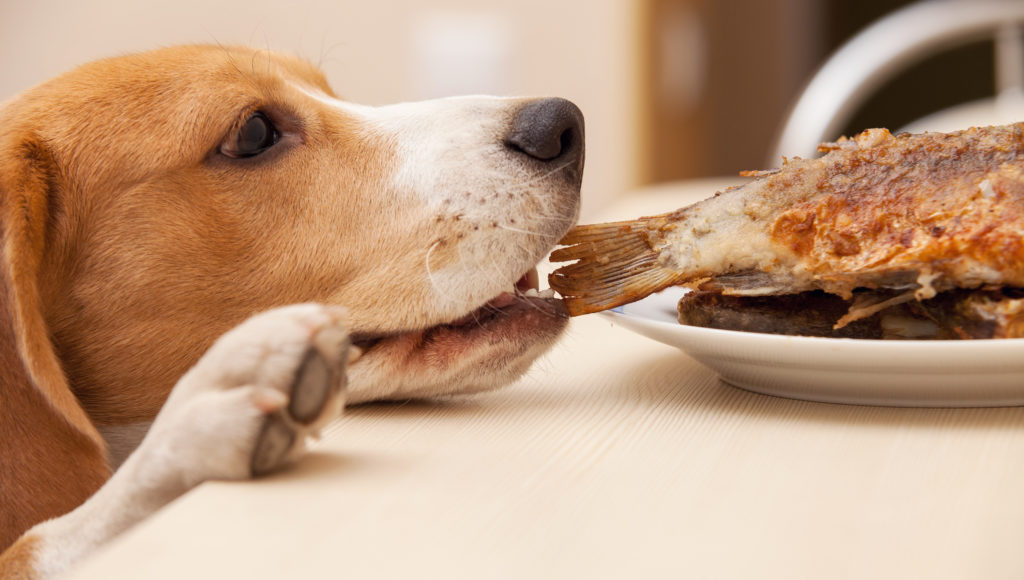Enjoy the holidays with your pets but remember to stick to their food

Beagle dog try to scrounge a fish from the table
By Jeanne Haggerty-Arcay

Dr. Jeanne Haggerty-Arcay
Part of what brings Morgan Hill residents together during the holidays is food … and lots of it. We all enjoy a little too much all things sweet, savory, chocolaty, salty, nutty and alcoholic.
We cook, bake and almost always have leftovers. And who is sitting waiting for a piece of something to fall to the ground with those sad eyes? Or worse yet, waiting for nobody to be paying attention to start counter-surfing? Most people are aware of the dangers of chocolate, but there are also some other hidden toxins commonly found in our favorite “human foods” that can be equally dangerous.
-
Chocolate: Chocolate is the favorite of many dogs (and a few cats). Different types have varying levels of the toxic ingredient, methylxanthine. Baking and dark chocolates have higher levels and are the most likely to cause vomiting, diarrhea, hyperactivity, heart arrhythmias, tremors and seizures.
-
Caffeine: Caffeine ingestion if often seen in combination with chocolate and other sweets. Coffee-infused desserts and drinks taste good to dogs and can lead to symptoms similar to those of chocolate ingestion.
-
Alcohol: Alcohol is rapidly absorbed from the stomach and into the bloodstream of dogs and cats, most commonly after eating an alcoholic dessert. Depending on the amount ingested, it can cause dangerous drops in blood pressure, body temperature and blood sugar levels. Since the alcohol is often ingested with a dessert, there may be other symptoms of chocolate intoxication (especially vomiting and diarrhea).
-
Pumpkin: Canned pumpkin has long been used as an easy and convenient source of fiber. Pumpkin is a good source of fiber and can be used to help with a variety of gastrointestinal diseases. However, if you are using canned pumpkin to supplement your pet’s food, be sure to read the label carefully. There is plain canned pumpkin as well and ready-made pumpkin pie filling, which is loaded with all the typical pumpkin dessert spices.
-
Meat & Bones: Despite the endless begging your dog may do for that prime rib, don’t give in. Fatty meats (most red meats, sausages, hot dogs, bacon, fat trimmings) are probably the No 1 cause of pancreatitis. Dogs do not have the capacity to process large amounts of fat and can easily develop pancreatitis, a potentially life threatening condition characterized by lethargy, vomiting and diarrhea. In addition, most meats offered are seasoned with garlic and onions, known toxins to dogs. Bones can become lodged in the mouth, esophagus or further down in the gastrointestinal tract. Sharp fragments can also cause damage to the lining of the gastrointestinal tract as they pass. If you feel compelled to offer a meaty treat, cook them their own plain chicken breast (skinless, boneless). Your pet will be just as happy but far less likely to be sick the following day.
-
Onion & Garlic: Onions are toxic to both cats and dogs. They contain disulfides and thiosulfides, which can cause anemia. Early symptoms often include vomiting and diarrhea (often compounded by whatever the onion was seasoning) with anemia following several days to a week later. The symptoms of anemia may include increased heart rate, rapid breathing, a yellowish discoloration to the gums and urine, and a general feeling of malaise.
Enjoy the holidays with your pets but remember to stick to their food or offer plain chicken as a special treat. Your pet desires attention more than food. Resist feeding them the leftover fat trimming and instead take your dog out for a walk. They will be much happier!






